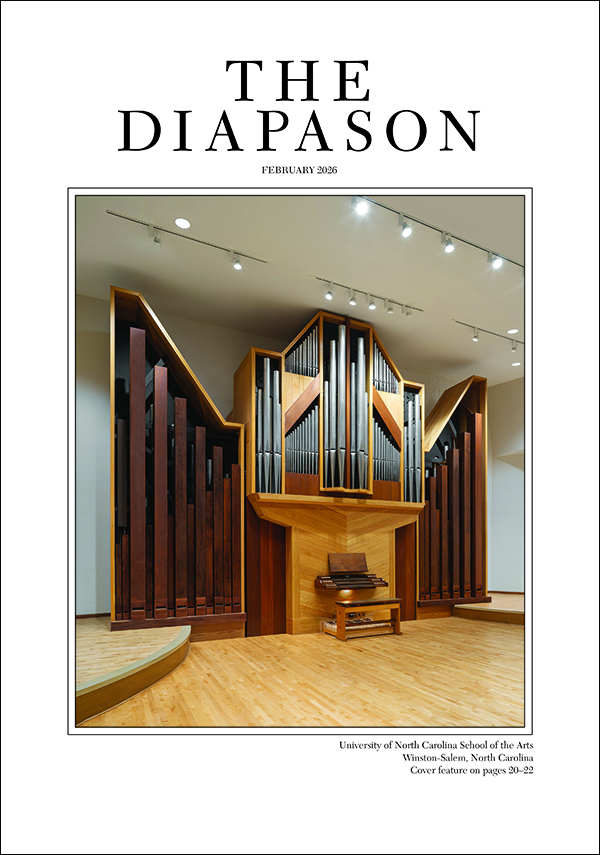
Nunc Dimittis
Grigg Thompson Fountain died in Albuquerque on February 14. He was 97 years old. Born in October 1918, in Bishopville, South Carolina, he attended Wake Forest College for a year and received a B.A. in music from Furman University in 1939. He earned B.M. and M.M. degrees in church music and organ from Yale University (1943), studying with Luther Noss, and studied organ privately with Arthur Poister (1945) and Marcel Dupré (1946). Drafted into the army in 1943, he received an honorable discharge within a year (due to poor eyesight). His training company was one of the first to land on Normandy beaches on June 6, 1944. He studied Baroque organ literature with Helmut Walcha in Germany on a Fulbright Fellowship in 1953–54. From 1946–1961 he taught at Oberlin Conservatory of Music during which time he worked with Robert Shaw. While at Oberlin, he met, taught, and then married Helen Erday in 1949.
In 1961 he was appointed professor of organ and church music in the School of Music at Northwestern University. He also served as organist and choirmaster at Northwestern’s Alice Millar Chapel. Fountain retired as emeritus in August 1986; within five months of retiring he was asked to come out of retirement and serve as interim organist, choir director, and consultant. He served there from 1987–89. (See Marilyn Biery’s compilation of 90th-birthday tributes to Grigg Fountain in the July 2010 issue of The Diapason.)
Grigg and Helen Erday Fountain celebrated their 60th wedding anniversary on April 2, 2009. Helen passed away on October 12, 2009. Grigg Fountain is survived by his children Bruce Fountain (Min Jung), John Fountain, Drew Fountain, and Suzanne Fountain Phillips; eight grandchildren, and one great grandchild.
Nikolaus Harnoncourt died March 5 in St. Georgen im Attergau, Austria. He was 86. Born in Berlin, he was raised in Graz, Austria, and studied music in Vienna. Harnoncourt was cellist with the Vienna Symphony Orchestra from 1952 to 1969. In 1953 he established the Concentus Musicus Wien, which explored Renaissance and baroque performance traditions through performances and recordings using period instruments. Most notable among these are the complete Bach church cantatas and Monteverdi’s three surviving operas. Harnoncourt moved on to later repertoire, including Haydn, Mozart, Schubert, and Bruckner, conducting modern-instrument orchestras such as the Concertgebouw Orchestra and the Chamber Orchestra of Europe. His range of repertoire gradually extended to the 20th century, with works of Bartók, Berg, and Gershwin (Porgy and Bess, recorded 2009).
Harnoncourt taught performance practice and the study of historical instruments at Salzburg’s Mozarteum since 1972. His scholarly publications include The Musical Dialogue: Thoughts on Monteverdi, Bach, and Mozart (Amadeus Press, 1989) and Baroque Music Today: Music as Speech (Amadeus Press, 1988). He leaves a legacy of more than 500 recordings, with highlights including a Beethoven symphony cycle with the Chamber Orchestra of Europe (Warner Classics).
Peter Frederic Williams, 78, noted organist, harpsichordist, and authority on the life and music of Johann Sebastian Bach, died March 20. Born May 14, 1937, in Wolverhampton, England, he became a choirboy at St. Leonard’s Church, Bilston. He studied music at St. John’s College, Cambridge, where his PhD degree focused on the church organ in Georgian England. He was appointed lecturer in music at the University of Edinburgh, where he was also curator of the Russell Collection of early music instruments. In 1982, he became the first professor of performance practice in England. He was appointed professor music, university organist, and chair of the department of music for Duke University, Durham, North Carolina, in 1985. Ten years later, he accepted a senior position at the University of Cardiff. In retirement, he continued an active career in writing. Among the many books he authored are: The European Organ: 1450–1850, A New History of the Organ From the Greeks to the Present Day, The Organ in Western Culture: 750-1250, and J. S. Bach: A Life in Music. He passed away hours after reading the final proofs of his last book on Bach. Peter Williams is survived by his wife, Rosemary Williams, their two sons, and a daughter and a son from a previous marriage.

